#laverne
Text
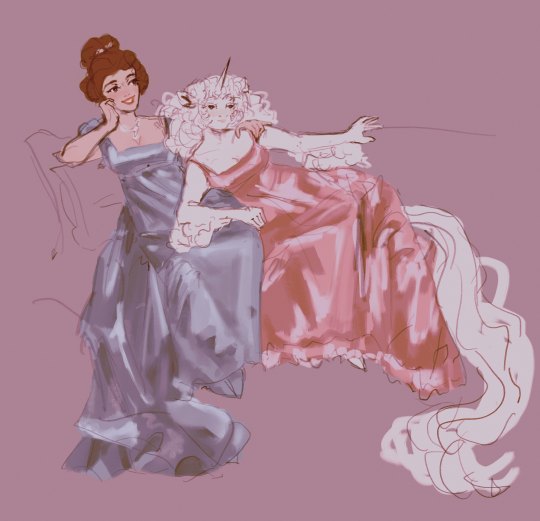
Quick fabric study of Vittorio Reggianini's "The Evening", with wives Laverne and Dia
306 notes
·
View notes
Text
everyone, cursed princess club
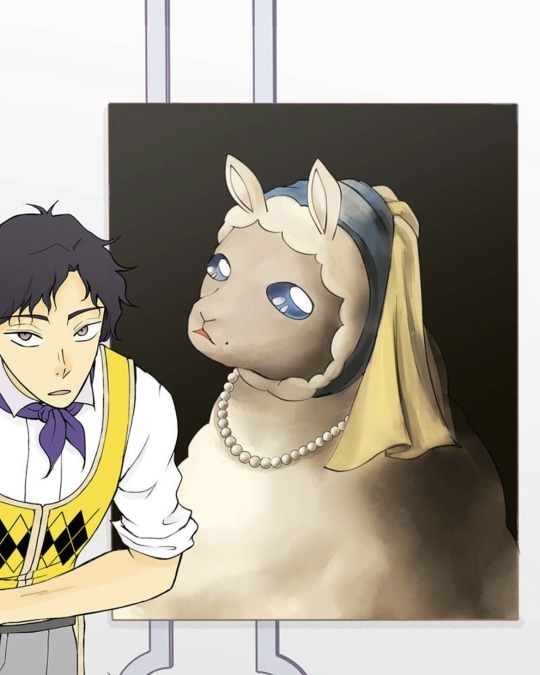
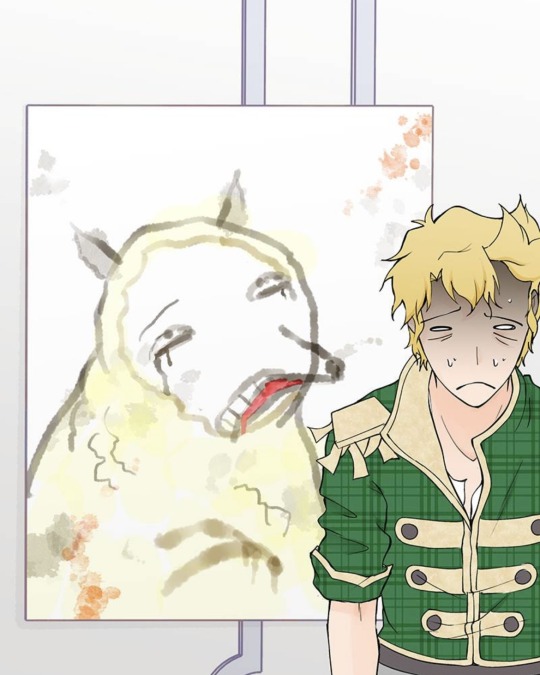
#I love this comic so much words cannot describe#Webtoon#cpc#cursed Princess club#cursed princess club webtoon#Cpc webtoon#Fambles#Leopold webtoon#Leopold cpc#Leopold cursed princess club#Frederick webtoon#Frederick cpc#Frederick cursed princess club#Prince Frederick webtoon#Prince frederick cpc#prince frederick cursed princess club#LAVERNE#laverne llama#Laverne cpc#Laverne cursed princess club
90 notes
·
View notes
Text
I need to stop ( thanks @cornus27florida for making me post it

Don't mind badly edited prez ( and why I didn't draw her)

Okay just a few more frederick stuff ಠ‿ಠ
#shitpost#cursed princess club#cpc#cpc blaine#cpc prez#cpc calpernia#cpc frederick#frederick#laverne#cursed image#uhh#really#i should stop
62 notes
·
View notes
Text

How will I survive 😭😭😭😭 I am so happy I got the chance to read CPC while episodes were releasing😭😭😭😭😭😭😭 Lanbcat, and the team who worked on CPC, thank you so much for this story, it's helped keep me motivated and it's helped me love myself a little more.
I'm gonna go cry in a corner now😭
#CPC#Cursed Princess club#CPC ending#I guess it's time to cry a river#This webtoon is so good like wtf 😭😭😭#CPC is such a gem#It took me by surprise ngl#I love it#Thank you Lanbcat and team!!!#Remember to live#love#Laverne
39 notes
·
View notes
Text
Character analysis: the gargoyles as a reflection of Quasimodo
[This is based on the interpretation that the gargoyles are Quasimodo’s imaginary friends, and that their traits can give us some insight into Quasimodo and his own mind and personality]
Part Two: Hugo
Of the three gargoyles, Hugo is the most fun-loving. At the beginning, when Quasimodo looks out at the city below, Hugo says “Hey Quasi! What’s goin’ on? A fight? A flogging?” As we see later during Quasimodo’s humiliation during the Festival of Fools and Phoebus and Quasimodo in the gallows in the Court of Miracles scene, many of the Parisians derive pleasure from public displays of mockery, torment, degradation, and death. And it’s a reflection of history too, a lot of medieval people viewed these kinds of things as sources of entertainment for them.
Being as sensitive and caring as he is, Quasimodo most likely would NOT enjoy those kinds of public executions or displays of torture—in fact, I imagine they would disturb and horrify him. I think that Hugo saying this line is more of a generalization of what the people of Paris find entertaining, rather than what Quasi himself does.

However, what Quasimodo does find entertaining is the Festival of Fools. It’s a joyous celebration with bright colors, confetti, drinking, and merrymaking. Hugo enthusiastically says, “All right, all right! Pour the wine and cut the cheese!” Victor mentions, “Watching the Festival of Fools has always been the highlight of the year for Quasimodo,” and Laverne emphasizes Quasimodo’s long-standing desire to join the festivities, saying, “What good is watching a party if you never get to go?”
Quasimodo deeply craves fun. He clearly wants to be part of this celebration—to seek that kind of freedom and enjoyment with the Parisians. During the part where the gargoyles encourage Quasimodo to join the festival, they come up with different reasons that he should attend. Being his imaginary friends, I interpret this as Quasimodo trying to overcome his own doubts. Hugo juggles the wooden figures and exclaims that there will be “Wine, women, and song!” and “Bobbin’ for snails!” He says “Playin’ dunk the monk!” while dunking Victor with a bucket of water. It shows a cheeky, playful sort of attitude towards religious authority figures like monks, and it also reminds me of Clopin’s line “It’s the day we mock the prig and shock the priest” with his Frollo puppet.

(side note: I also wanted to bring up the part at the beginning where Victor chastises Hugo, “That’s what you get for sleeping with your mouth open” and Hugo sarcastically retorts, “Heheh… go scare a nun.” Also, encouraging Quasimodo to go to the festival, he quips, “No, the Pope. Of course, you!” while putting the wooden figure of a clergyman into Quasimodo’s mouth. This might be a bit of a stretch, but I read that Victor Hugo’s original book has some anti-clerical elements, as he felt disillusioned with the institution of the church at the time he was writing it.
Religion can be a very beautiful, inspiring, and wonderful thing. But unfortunately, some people will weaponize faith for their own personal ambitions, and corruption in churches and other religious institutions is a real issue. Perhaps Hugo the gargoyle lightly poking fun at these clerical figures is a subtle nod to that same concept in the book? After all, in this movie, Quasimodo is raised by a cruel man who claims that the horrific crimes he commits are all in the name of God. Even though Frollo is a judge and not an archdeacon in this adaptation, I feel like the point still stands)
Anyway, back to Hugo and his antics. He loves to have fun, acting unabashedly goofy and outrageous. He plays card games (“I’m losin’ to a bird!”) he crushes on Djali, and he messily eats food and smokes a sausage. Hugo is never afraid to get silly, which is especially prominent during “A Guy Like You.” Using things to imitate curly hair, getting dizzy and seeing double, dangling wooden figures in the gallows (some dark humor), acting as a barber and giving Quasi an over-the-top wig, grinning suavely while pretending to be the head of the muscular statue, getting his horns stuck, and dressing up like Esmeralda.

(look at Quasimodo’s amused smile here :)
Throughout the song, Hugo calls Quasimodo “kid” a lot as a reassuring, affectionate term, and he tries his best to hype him up and make him feel good. Quasimodo and the gargoyles bounce on a cloth like a trampoline, again showing Quasimodo’s strong desire to have fun.
Going back to the point about the Festival of Fools, and Quasimodo being fun-loving, it makes sense why he would want to join. The boisterous revelry, bright colors, singing, dancing, and hedonistic nature of the festival must be incredibly appealing for someone like him. Being isolated in the bell tower for twenty years has really taken a toll on him. His upbringing under Frollo is very strict and ascetic—the alphabet lesson emphasizing sin (abomination, blasphemy, contrition, damnation, eternal damnation)
When Quasimodo absentmindedly says “festival,” he betrays his true desires, and Frollo quickly notices. Realizing his slip-up, Quasimodo becomes more anxious and stutters, “F…f-forgiveness.” But Frollo sees right through him, and he presses, “You said… festival.”
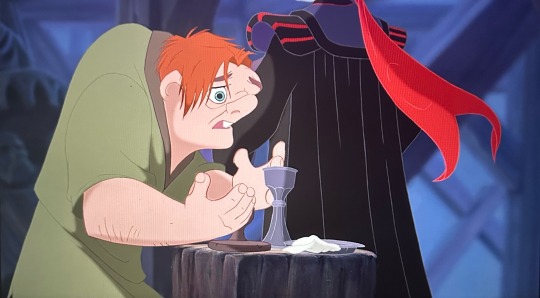
With a look of regret and worry in his eyes, Quasimodo covers his face with his hands. He unsuccessfully tries to reason with Frollo, who swiftly and sternly shuts him down.
Hugo is loud and unapologetic—and, deep down, I think that this is what Quasimodo wishes he could be to Frollo. But Frollo has been an imposing figure to him all his life, and he does not feel like he can stand up to him (until the film’s climax)
I also wanted to point out Quasimodo’s internal resentment towards Frollo. At their lunch, when Frollo asks, “Shall we review your alphabet today?” Quasimodo looks down and mutters, “Oh…yes, Master, I would like that very much.” His tone has a very subtle bite of sarcasm, hinting at his bitterness. But Frollo doesn’t pick up on it, and he continues speaking to Quasimodo as normal. In fact, I don’t think it occurs to Frollo to even consider that Quasimodo is being snarky here.

In the grape scene, when Frollo realizes that Quasimodo helped Esmeralda escape, he loses his temper and thunders, “You idiot! That wasn’t kindness, it was cunning!” He violently grabs Quasimodo by the tunic, shaking him and yelling “Think, boy! Think of your mother!” Then, after calming down and clearing his throat, he says, “But what chance could a poor, misshapen child like you have against her heathen treachery…”
With his condescending attitude, Frollo consistently underestimates Quasimodo’s intelligence. He treats him as though he is lesser—and, fundamentally, I don’t think he really sees Quasimodo as a person. Frollo believes that Quasimodo is incapable of thinking for himself, and so he imposes his own beliefs on him. In “Out There,” he sings, “I who keep you, teach you, feed you, dress you” while holding Quasimodo’s face, demanding that Quasimodo be grateful towards him. Ultimately, Frollo assumes that Quasimodo isn’t capable of free thought or free will. And, in his own cruel and twisted sense of self-righteousness, he sees himself as a “savior” to someone he perceives as below him, devaluing Quasimodo because of his physical deformity.
And, VERY understandably, Quasimodo resents Frollo for this. Even if he does not outwardly show it much, he has been accumulating a sense of bitterness for all the years that Frollo has mistreated him. I believe that Hugo is representative of Quasimodo’s desire to disobey Frollo. When encouraging him to go to the festival, he says with a mischievous smile, “Who says ya gotta ask? You sneak out… and ya sneak back in.”

“You could wear a disguise! Just this once. What Frollo doesn’t know can’t hurt ya.” Suggesting that Quasimodo not tell Frollo about his escapade, he encourages him to assert his independence.
Later, in the dialogue leading up to “A Guy Like You,” Hugo holds a deck of cards and says, “If I know Esmeralda, she’s three steps ahead of Frollo and ask out of harm’s way.” He holds up a three of hearts when he says the word “three,” and flips it. When he says “Frollo,” he holds up the joker card.


The implication here being that Frollo is a joker, a buffoon, a fool. It’s a subtle and impudent jab at him that suggests that while Quasimodo might fear Frollo for how controlling and cruel he is, he doesn’t entirely respect him as a figure of authority. Through his imaginary friend Hugo, Quasimodo lightly makes fun of Frollo as a way to “get back” at him, coping with how horrible he is.
I also wanted to explore how Hugo reflects Quasimodo’s feeling towards Phoebus. After Quasimodo forces Phoebus to leave the cathedral, Hugo congratulates Quasi and says, “The nerve of him! Snoopin’ around here, trying to steal your girl!” and “Way to go, lover boy!”
He really encourages Quasimodo and raises his hopes of being with Esmeralda. Later, when talking about Esmeralda, Victor says, “Knights in shining armor certainly aren’t her type”—alluding to Phoebus—and Hugo adds, “And those guys are a dime a dozen! But you, you’re one of a kind.”
In “A Guy Like You,” he constantly references how Quasimodo is unique. He sings, “A guy like you, she’s never known, kid” and “You’ve got a look, that’s all your own, kid.” Hugo also tries to elevate Quasimodo’s self-esteem by comparing him to other guys (read: Phoebus). He knocks around wooden figurines hanging from ropes, singing,
“Those other guys that she could dangle / All look the same from every boring point of view!” (also, this might be kind of a stretch, but the figures being blonde and having shoulder-length hair might be a little reference to Phoebus too haha)
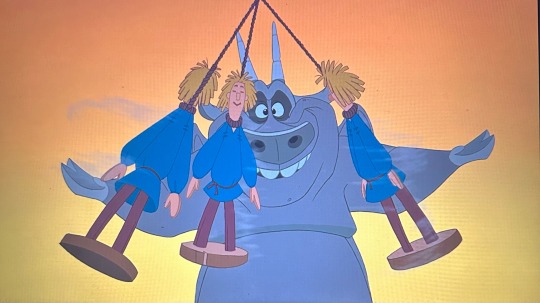
Hugo positively affirms again to Quasimodo, “You’re a surprise from every angle / Mon Dieu above, she’s gotta love a guy like you” (side note: I love the ringing of the bells on that second line, something about it sounds so sweet :)
Immediately after the song, Esmeralda brings an injured Phoebus to the bell tower and she asks Quasimodo to hide him. The kiss scene happens, and Quasimodo quietly cries, broken-hearted. But he still helps hide Phoebus, and after the grape scene with Frollo, Quasimodo expresses doubt about himself, bitterly saying, “She already has her knight in shining armor, and it’s not me.”
But his compassion wins over—he cares about Esmeralda so much that it overpowers his resentment towards Phoebus. Of course, he still feels really hurt after seeing Esmeralda and Phoebus kiss, and so he acts bitter and quarrelsome around Phoebus. I really appreciate this because I think it makes Quasimodo more real and believable as a character. Yes, he is a very sweet and sensitive person, but he’s also capable of being jealous and petty, and I feel like that contrast makes him really interesting.
Phoebus pats Quasimodo’s back and asks, “Truce?” After hesitating, Quasimodo says, “Well… okay,” with a forceful pat on Phoebus’ back (right where the arrow struck him)

Phoebus grimaces in pain, and as they head off to follow the map, Quasimodo utters a simple “sorry.” Phoebus grumbles, “No you’re not.” It’s a funny exchange, and another example of Quasimodo being bitter. Like I said before—although he is an overall kind and gentle person, he also has moments of spite, and I think these add some wonderful nuance to his character.
In conclusion, as an imaginary friend, Hugo reflects Quasimodo’s sense of humor, his fun-loving nature, his desire for independence, and his potential for irreverence. While Quasimodo is overall a very loving and gentle person, he also harbors resentful feelings towards Frollo, and a grudge against Phoebus (the latter fading away as the two develop a stronger trust and friendship :)
#quasimodo#victor#hugo#laverne#gargoyles#frollo#phoebus#character analysis#the hunchback of notre dame
26 notes
·
View notes
Text

creo q fue una request de /v/ que hice cuando estaba biennn agarrada de day of the tentacle. wenos tiempos
28 notes
·
View notes
Text




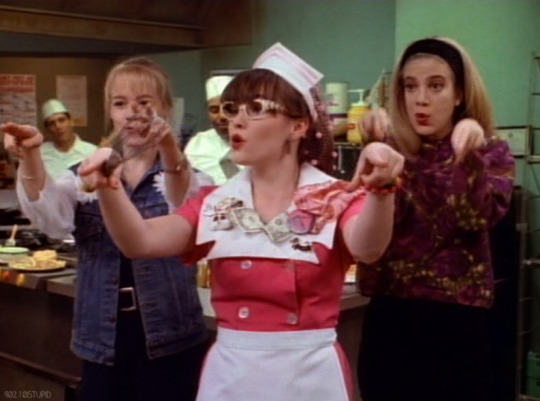
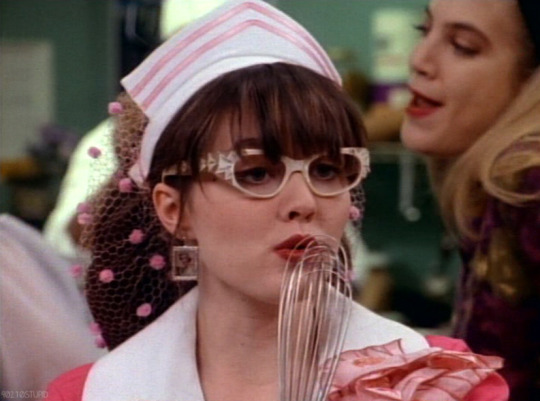
30 notes
·
View notes
Text
So… I have a new obsession.
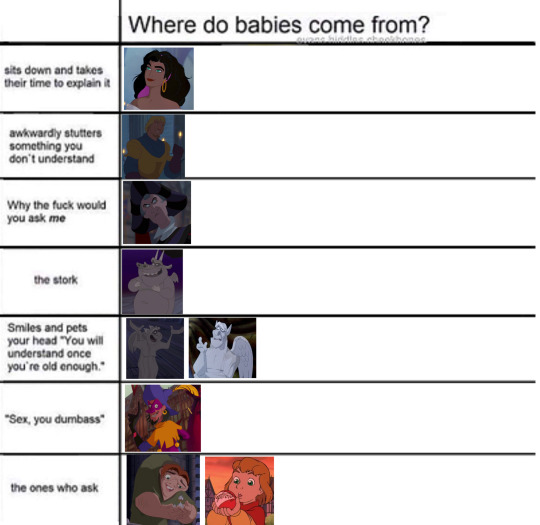
#the hunchback of notre dame#esmeralda#Phoebus#claude frollo#victor#hugo#Laverne#clopin trouillefou#quasimodo#zephyr#alignment chart
274 notes
·
View notes
Text

Laverne!!
Edna's former wife. They divorced months after the disappearance of their eldest daughter, Wren Bost.
Overcome with a mix of emptiness and desperation, Edna left their home planet to find Wren, while Laverne and Aria stayed.
They both miss each other terribly :(

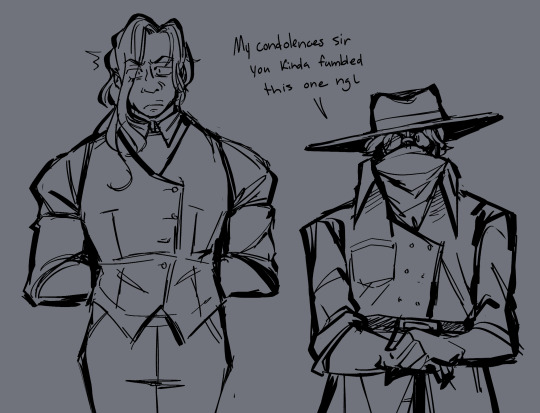

plus some not-so encouraging words from Lurk
8 notes
·
View notes
Text

11 notes
·
View notes
Text
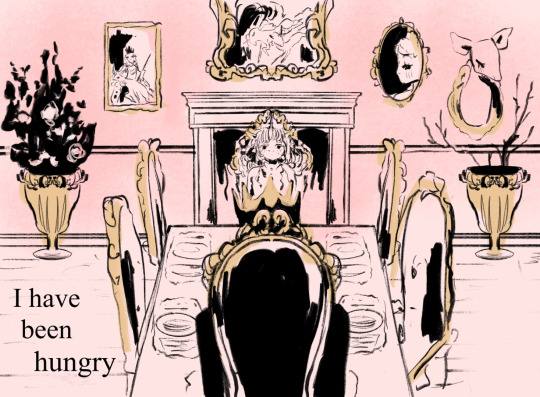
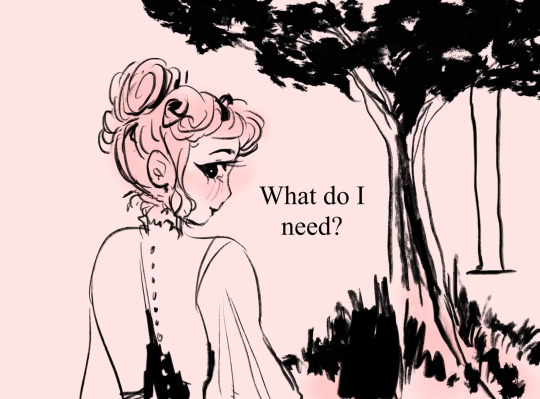

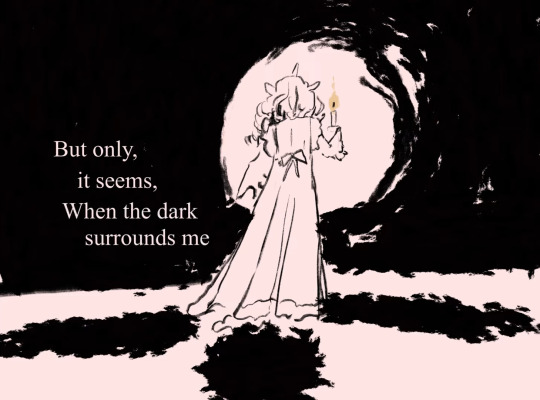
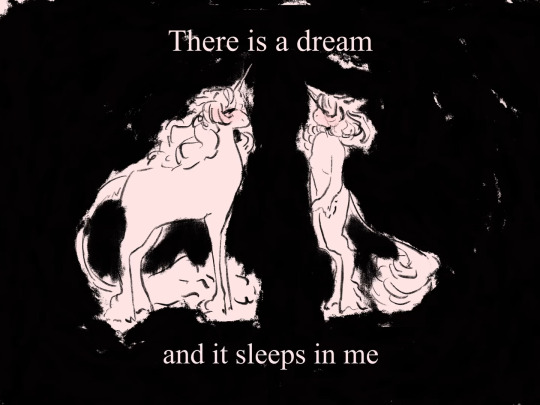
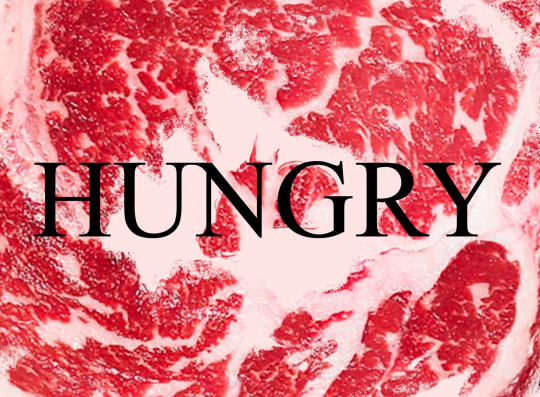
Hungry PMV
433 notes
·
View notes
Text
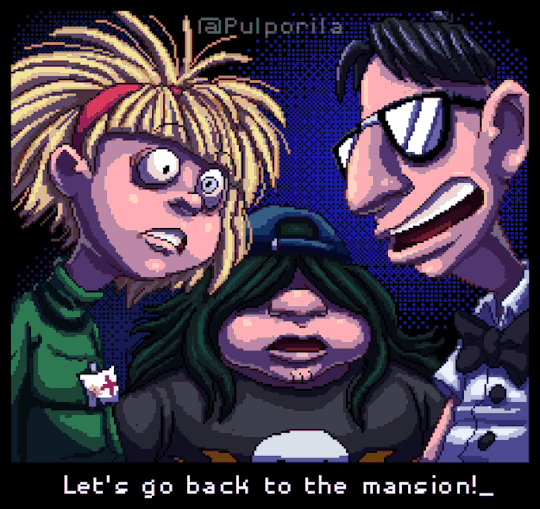
Did this one a while ago when I was still obsessed over Day of the Tentacle and used aseprite every single day. Good times.
Still ver:
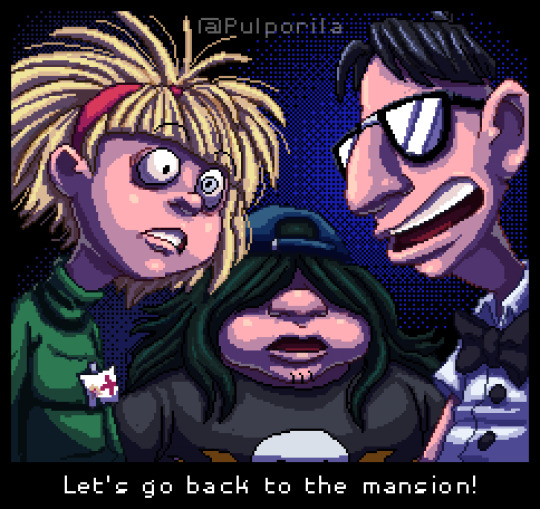
#day of the tentacle#lucasarts#double fine#maniac mansion#gaming#retro gaming#laverne#point and click#art#my art#fanart#dott#artists on tumblr#pixel art#hoagie#bernard#bernard bernoulli
78 notes
·
View notes
Text
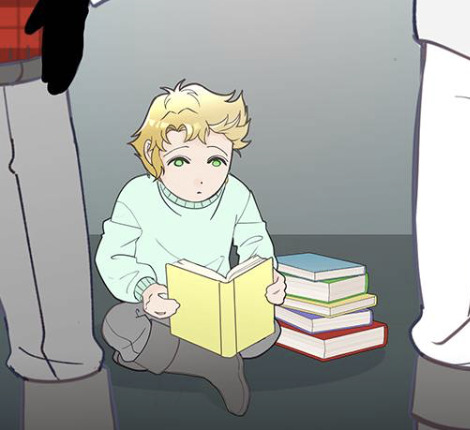
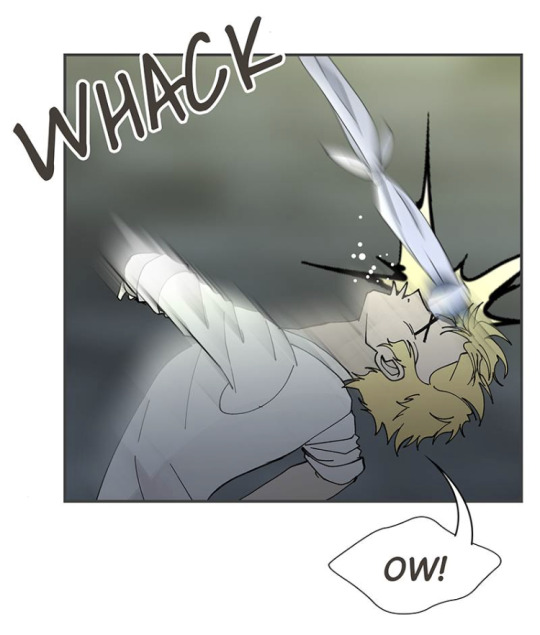
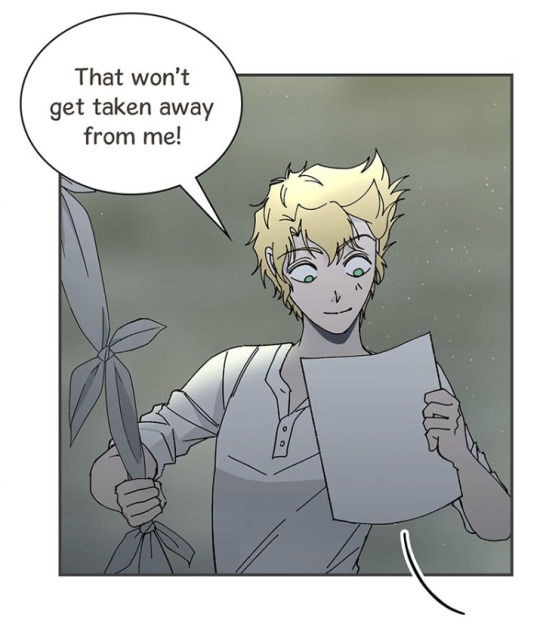
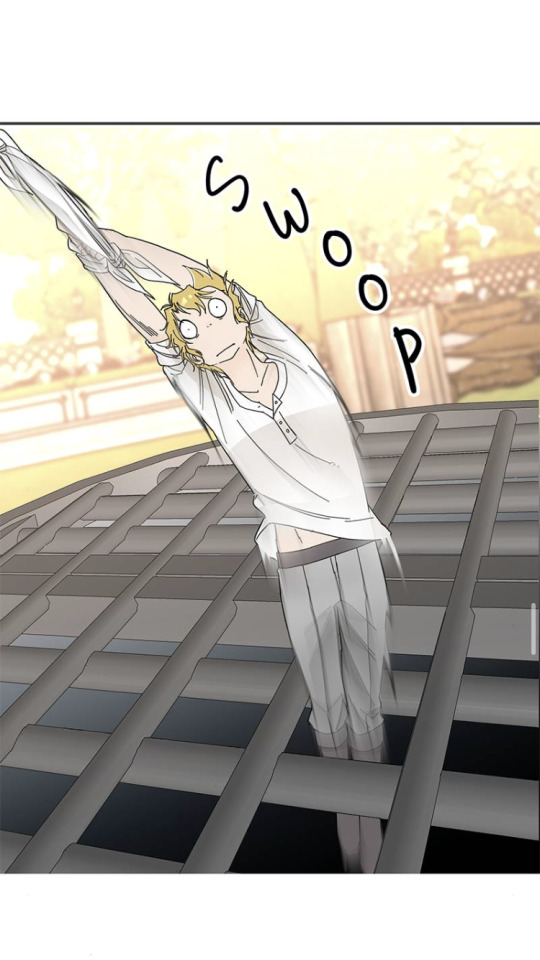
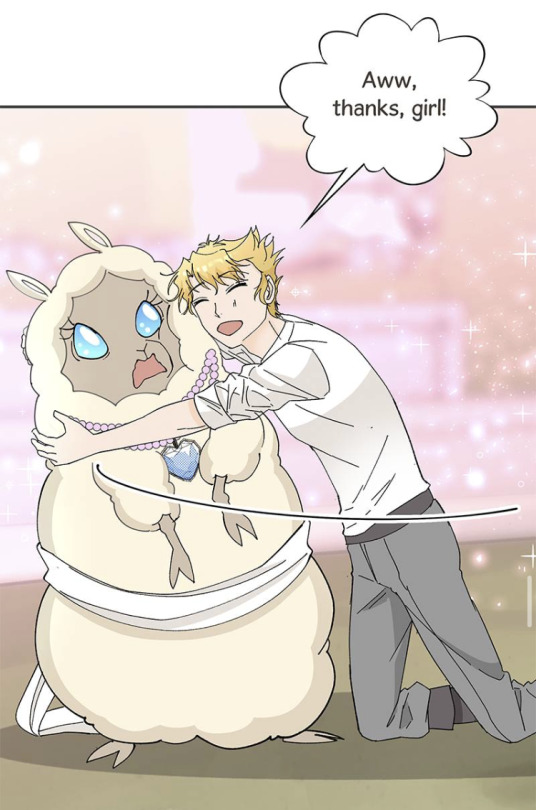
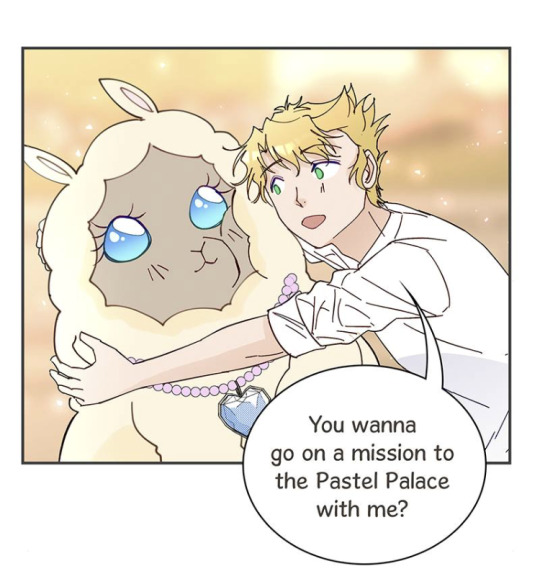

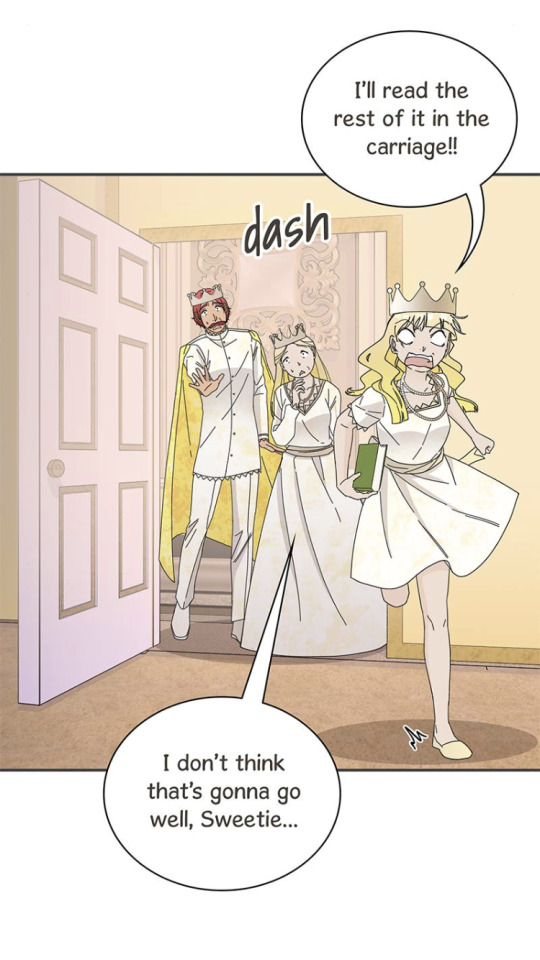
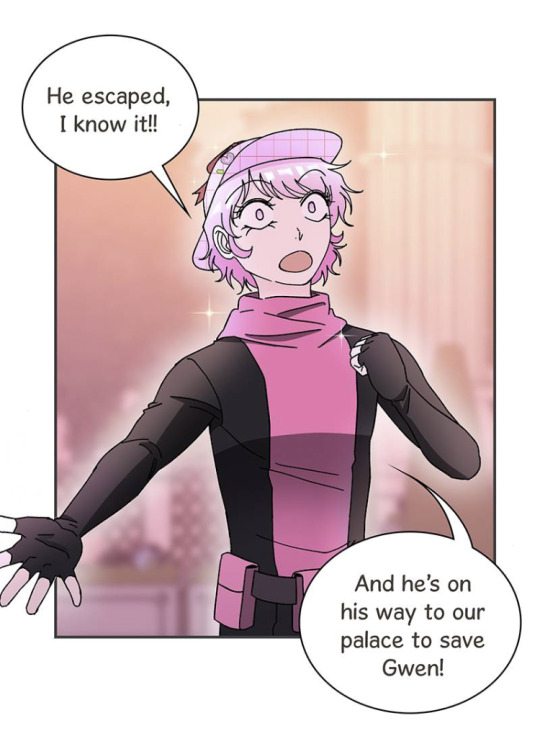
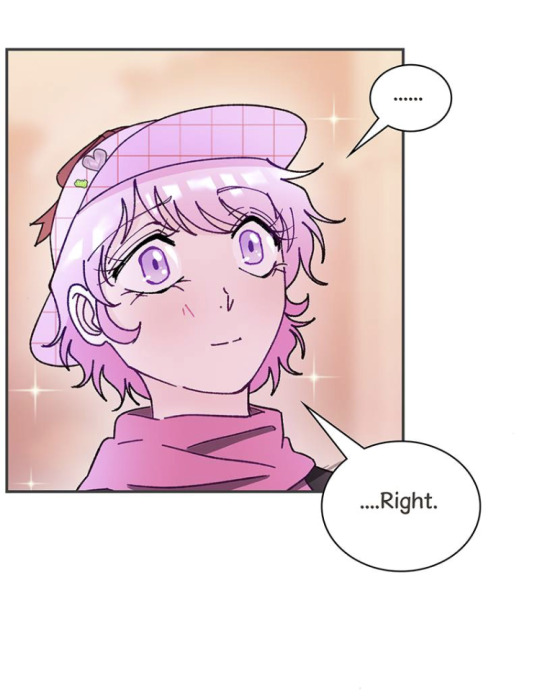
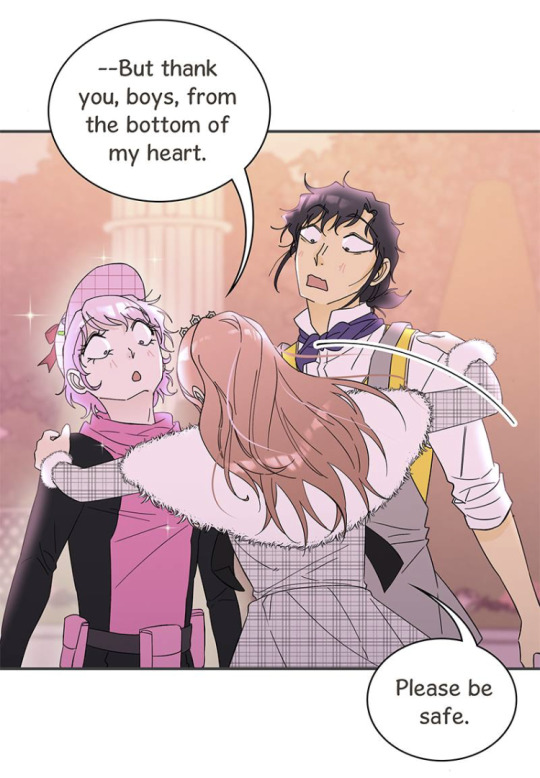
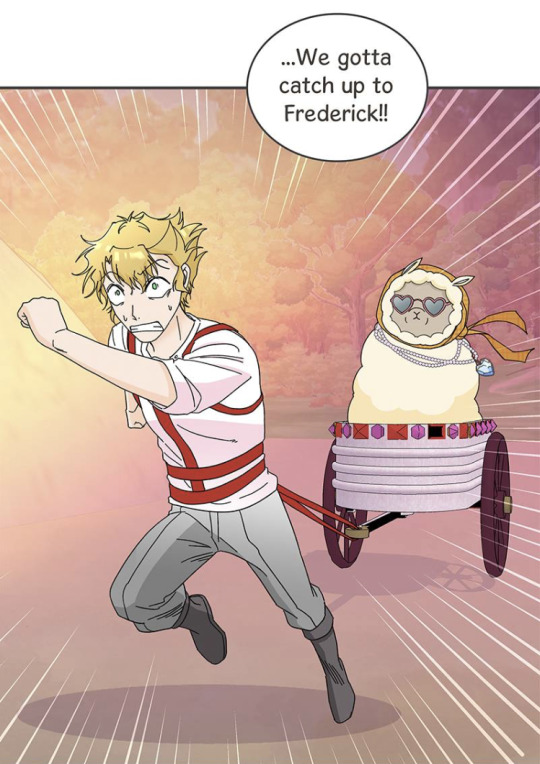
This week's episode has so many good moments!
#cursed princess club#cpc#frederick#isolde#jamie#leopold#laverne#screenshots#the top right image was initially gonna be my icon of the week but then i saw laverne in the last panel and then i picked her instead#sorry freddie boy you can be my youtube channel's icon <3
55 notes
·
View notes
Text
laverne
#cursed princess club#laverne#I WAS JUST THINKING ABOUT WHERE SHE WAS IN THE LAST EPISODE#AND SHE'S UP TO SOMETHING GOOFY PROBABLY . I KNOW IT
8 notes
·
View notes
Text
Character analysis: the gargoyles as a reflection of Quasimodo
[This is based on the interpretation that the gargoyles are Quasimodo’s imaginary friends, and that their traits can give us some insight into Quasimodo and his own mind and personality]
Part 1 - Victor
Victor is the first of the gargoyles and the most sensitive of the three. Right from the beginning, he shows an awareness for Quasimodo’s feelings, immediately noticing that his attitude is despondent. He alerts Hugo to this too, and they both discuss what might be troubling their friend.
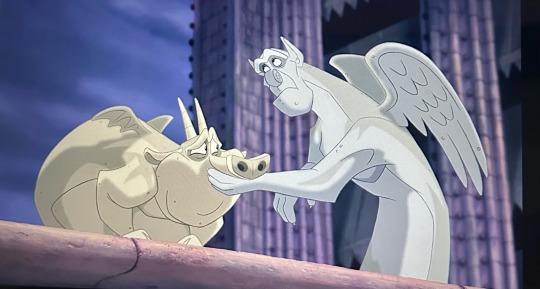
In our first real introduction to Quasimodo, we see him taking care of a baby bird and encouraging it to fly. Right away, we get a sense of his gentleness and how receptive he is to the needs of others. Quasi has a wonderful capacity for compassion, and I think that Victor’s sensitivity and emotional alertness is a reflection of this part of Quasimodo. Quasimodo is so inherently selfless that he takes care of others with no expectation of reciprocity—he genuinely just wants to help.
There’s something especially heartbreaking about the gentle and caring way that Quasimodo treats the bird, when he himself has never known that kind of love. Like, he’s giving to others what he wishes he had. This is further emphasized when Laverne echoes his own words to the baby bird, “No one wants to stay cooped up here forever.”
I also believe that Victor is representative of Quasimodo’s strong desire to know more about other people, their lives, their traditions, and their culture. When encouraging Quasimodo to go the Feast of Fools, he suggests “you could learn to identify various regional cheeses!” and “study indigenous folk music.” He places emphasis on the learning value of joining the festival, saying, “It would be a veritable potpourri of educational experience.” (side note: I love the pope pun here haha, combined with the little wooden figure)

In “A Guy Like You,” he has strong ties to cultural icons like the statue of David (at least, I think that’s what the animators are parodying here) and he wears a bow tie as he plays the grand piano by candlelight as Laverne sings.
Interpreting Victor as an imaginary friend, reflecting the traits of Quasimodo’s mind, it feels natural that Quasi also appreciates art and music. He loves human expression. He wants to connect with other people and understand how their minds work, how they explore their feelings and beliefs through their creations.
(also, on the part with the statue, I want to point out Victor timidly peeking after he covers the statue’s member. In some ways, I feel like this is a parallel of Quasimodo’s own bashful nature)

(also, in “A Guy Like You,” when Hugo says “You’ve got a look, that’s all your own, kid,” he does a picture-frame gesture towards Quasimodo with his hands/hooves, and Quasimodo draws back slightly and raises up his own hand in a gentle protest, again showing his shyness and reluctance to draw attention to himself)
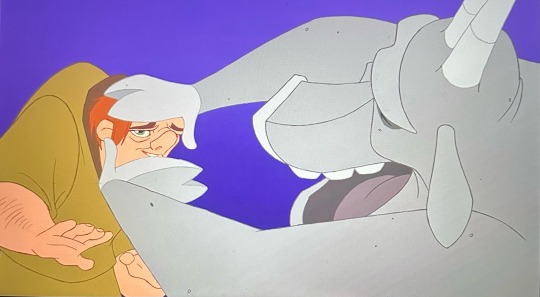
Anyway, back to the point about appreciating art and culture—we see Quasimodo expressing his own artistry, creativity, and self-expression through his wooden figurines. Constructing these figures and imagining himself among the people really demonstrates his potential for empathy and his desire for connection. With his figurines, he lives vicariously through this miniature model of the city, desperately seeking out that kind of companionship and longing to join the Parisians.
In “Out There,” he wistfully sings, “All my life I memorize their faces / Knowing them as they will never know me” and he expresses a powerful desire to connect with them. He is deeply interested in their lives, their interests, and their personalities, saying how he is “Hungry for the histories they show me” and taking a curious, compassionate interest in them.

Quasimodo has a wonderful capacity for creation. When he shows Esmeralda around the bell tower, she marvels at the decoration and asks, “Did you make all these things yourself?” and Quasi softly replies, “Most of them.” He’s very humble in his response, and he hides behind a pillar as he says this line, again not wanting to draw attention to himself. Even around Esmeralda, the person who, at this point, has shown him the most kindness out of anyone, he feels really self-conscious and he is reluctant to step out into view.
Part of it might be his crush on Esmeralda and the ensuing nervousness, but I definitely think that he is also acting this way because of how Frollo raised him, constantly repeating the idea that he is a “monster” and really damaging his self-esteem. He only runs out from behind the pillar in a flustered panic when Esmeralda pulls the cover off of his unfinished wooden figures. But as he gets more comfortable around her, he introduces her to the bells and leads the way.
He cares deeply for Esmeralda—his feelings for her are compassionate and pure. This makes it all the more stressful for him when he fears she might be in danger, especially while seeing Paris burn and not knowing her whereabouts.
As the gargoyles look out, Victor frets, “I’m beginning to fear the worst” and he tries his best to be “stone-faced” when Quasimodo walks in, not wanting to upset him any further. He’s also the first to crack under pressure and and burst into a very emotional, tearful display when Quasimodo asks, “Is there any sign of her?”

Although Quasimodo is not crying in this scene, I feel like Victor is a representation of his most extreme inner feelings at the moment—catastrophizing the situation and harboring fears for Esmeralda. He genuinely just cares about her that much, and he knows that he would be devastated if anything bad happened to her.
Quasimodo shows himself to be a deeply emotional person, and cries the most out of any character in the film—crying with joy when he is crowned the King of Fools, crying with sorrow and humiliation when the crowd tortures him, crying with heartbreak when he sees Esmeralda and Phoebus kiss, and crying with grief when he believes that Esmeralda is dead. He feels with his entire heart, loving fiercely and experiencing the world with very powerful emotions. And I think that’s a really beautiful quality about him. His sensitivity is part of what makes him so strong. And his empathy for other people is the emotional core of “Out There,” his desire to live among society and know them, to find community.
Seeking companionship and love, he makes up the gargoyles as imaginary friends in his mind. By extension, he imbues them with some of his own personality traits. Victor as an imaginary friend reflects Quasimodo’s sensitivity, artistry, shyness, empathy, and emotional nature :)
20 notes
·
View notes
Text
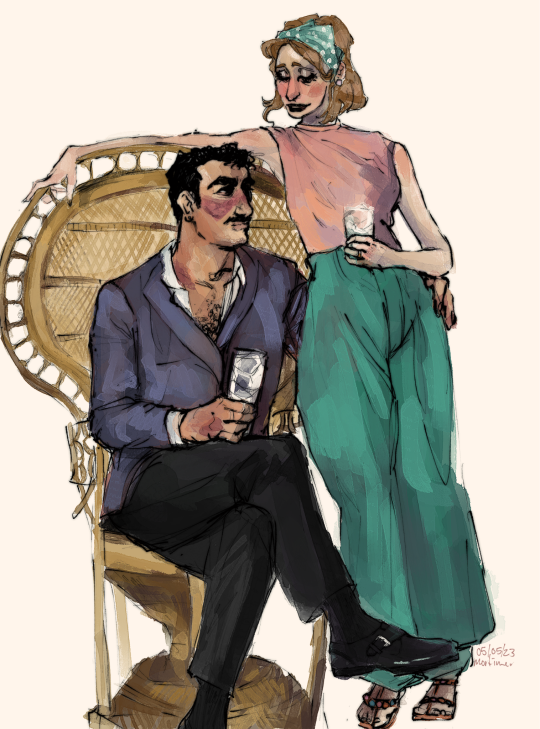
young woman share your fire with me
refernced off a 1960s ad for gilbey's gin i saw in an old magazine
youtube
#illustration#painting#ocs#mercy for the black ice#marcus#laverne#speedpaint#< its under the cut#2023
36 notes
·
View notes